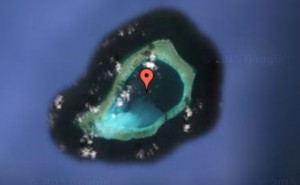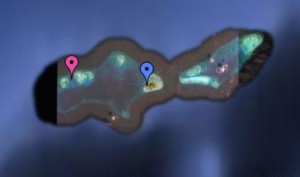Will HBO’S Oliver have effect on Spratlys?
Ask the average Filipino, the average American, the average global world citizen about the Spratlys and you know what to expect.
Ano yan?
Is that like a Kardashian?
But for those who follow the news, the Spratlys are a big deal. Bigger than Kim’s you-know- what.
And now the Spratlys could be getting a shot in the you-know-where. As an issue, that is.
This week HBO comedian/satirist John Oliver has noticed the issue of China’s aggression in the waters west of the Philippines. And when Oliver has commented, the world usually builds an awareness of the issue.
It’s called the Oliver effect, and it often has made a mass audience aware of something right under their noses.
So when Oliver notes that the Chinese like to play Kenny G’s saxophone music to close malls in China, signaling to Chinese shoppers to go home, Oliver extends the idea to foreign affairs.
On his HBO Show, “Last Week Tonight,” Oliver brought out Kenny G to play, in essence signaling to China that it’s time to leave the Spratlys alone and go home.
As I like to say, better to make sax, not war. And the show played off to the credits.
But the Chinese are still there. Maybe the effect needs a little time.
Forget the old joke about the Chinese Navy being a bunch of junk. It’s big and ready to strike in the South China Sea.
According to a white paper–the first public summary of military strategy from China—released earlier this year, its navy is expanding and ready to “counter-attack if attacked.”
They’re building up some real muscle over there in the South China Sea, specifically on tiny specks of isles named for an English seaman who captained prisoner ships in the 1840s.
That would be Dick Spratly, and the islands and reefs that bear his name could be the next hair trigger in Asia.
Add to that a few more recent aggressive acts and it’s really is time to get to know your Spratly Islands.
I know, they look like errant amoeba or paramecia. But these are satellite photos of the aforementioned microscopic Spratlys, which are claimed by China and other countries nearby, including the Philippines, Vietnam, Brunei, Malaysia and Taiwan.
Guess what? China is trying to big foot them all and it could be the next big conflict in Asia. Maybe even the world.
Not only is there an abundance of fish and marine resources, but there are also oil reserves deep down beyond the ocean floor.
The Philippines, in particular, is concerned because of its claim to Thitu Island (also known as Pagasa Island, adjacent to Sandy Cay).
The Philippines’ ragtag navy defending its Spratly holdings includes a rusted ship that’s run aground, a kind of placeholder to let people know that it has more than just dibs on Thitu and the other islands in what the Philippines calls the West Philippine Sea.
But a constant threat to the southwest of Thitu is nearby Subi Reef, where China has been reclaiming land and has installed a three-story building.
This year, the U.S. Navy and an embedded CNN crew videotaped on another of the eight Spratlys claimed by China, Fiery Cross Reef.
The Navy’s operation unveiled an early warning radar installation, military barracks, a lookout tower, and a runway long enough to handle every aircraft in the Chinese military.
It was referred to as China’s “unsinkable aircraft carrier.”
When the surveillance plane was detected, China sent out a loud warning, which in turn seemed to inspire the aforementioned White Paper.
Said China spokesman Col. Yang Yujun to reporters: “There are people deliberately stirring up such discussions, with the aim of smearing the Chinese military and raising regional tensions–we can’t rule out an intention to find excuses for justifying future action by certain countries.”
And that would be who exactly? The Philippines? Or its ally the U.S.?
Meanwhile, China dismisses building on the reefs, saying it was no different than the construction of homes and roads in a new subdivision.
Yeah, but your subdivision might have a Wal-Mart nearby. This one has its own Chinese military airstrip.
Lately, there has been a lot of Spratly rattling going on. But if anything, it should help build awareness that a concern even exists.
In the meantime, the revelations of China’s buildup in the Spratlys only confirm what many Filipinos have long known.
China’s not backing down, and it’s only getting more aggressive.
American Filipinos, like New York resident Loida Lewis, are leading the charge in the U.S.
Lewis notes China never disputed the Philippines’ claim to the Spratlys, which was submitted to a UN Tribunal. But once the Philippines wins there, Lewis fully expects China to ignore the decision and make the Philippines enforce the claim.
In a letter to Philippine President Benigno S. Aquino, Lewis earlier this year, she wrote:
“China knows that possession is 99 percent of the law. That explains the rush of China to reclaim the land in the West Philippine Sea knowing full well that when the UNCLOS Tribunal decides in favor of the Philippines, the United Nations is powerless to execute its judgment against China.”
Lewis and her group, the U.S. Pinoys for Good Governance, have been calling for a boycott of Chinese goods since last year to help publicize their cause.
It’s largely a symbolic act. But Lewis wants the world to know the Spratlys are no joke.
And with the shopping season ahead, it may be a good time to think about weaning yourself off Chinese goods to see if that makes the Chinese stop coveting your Spratlys.
Whatever little gesture we can do, we should.
We can’t wait for the Oliver effect to take hold.
Emil Guillermo is a native San Franciscan and award-winning journalist and commentator.
www.fb.com/emilguillermomedia, www.twitter.com/emilamok, www.amok.com
Like us on Facebook


